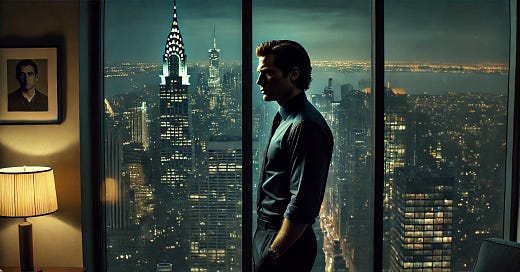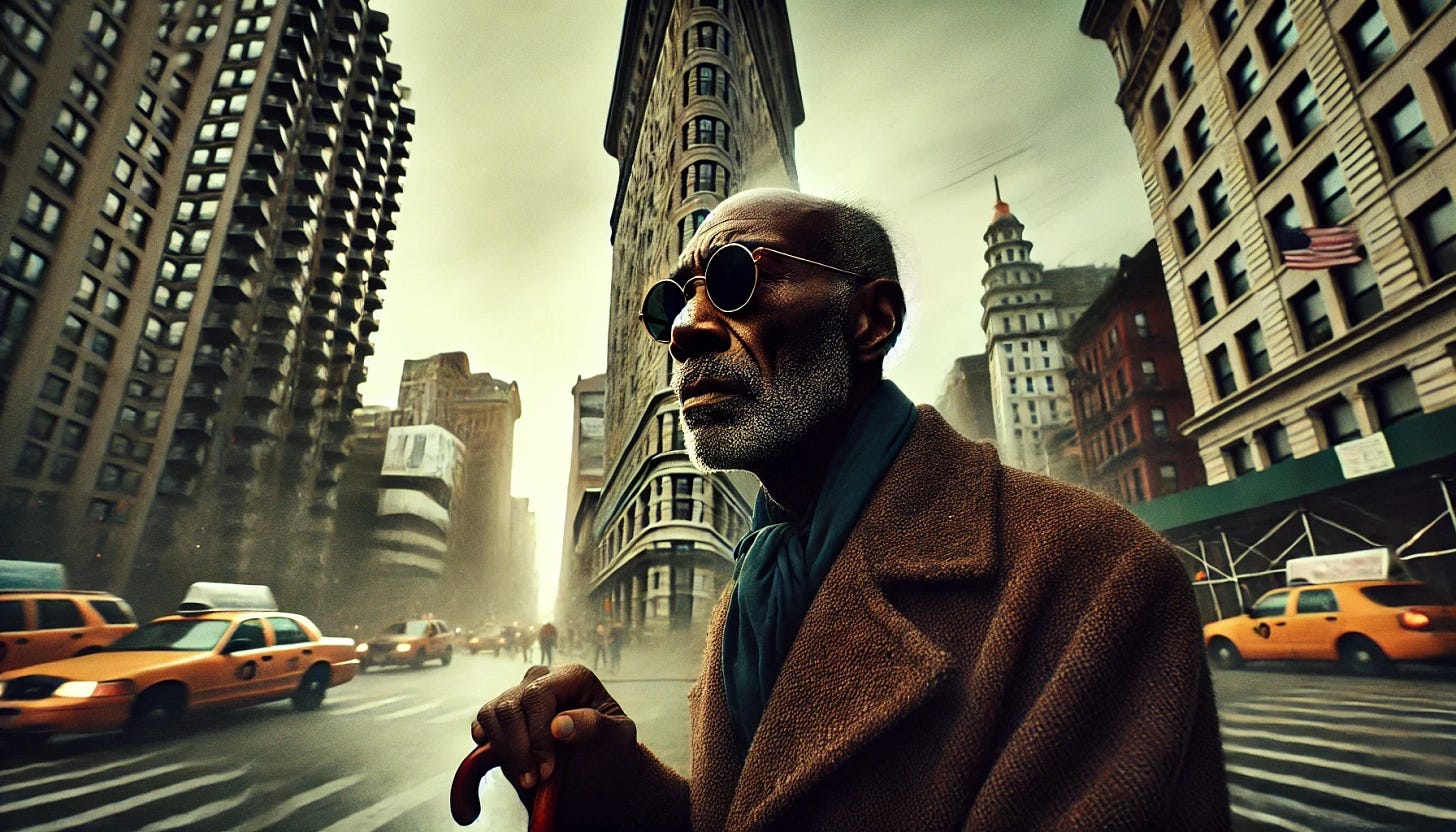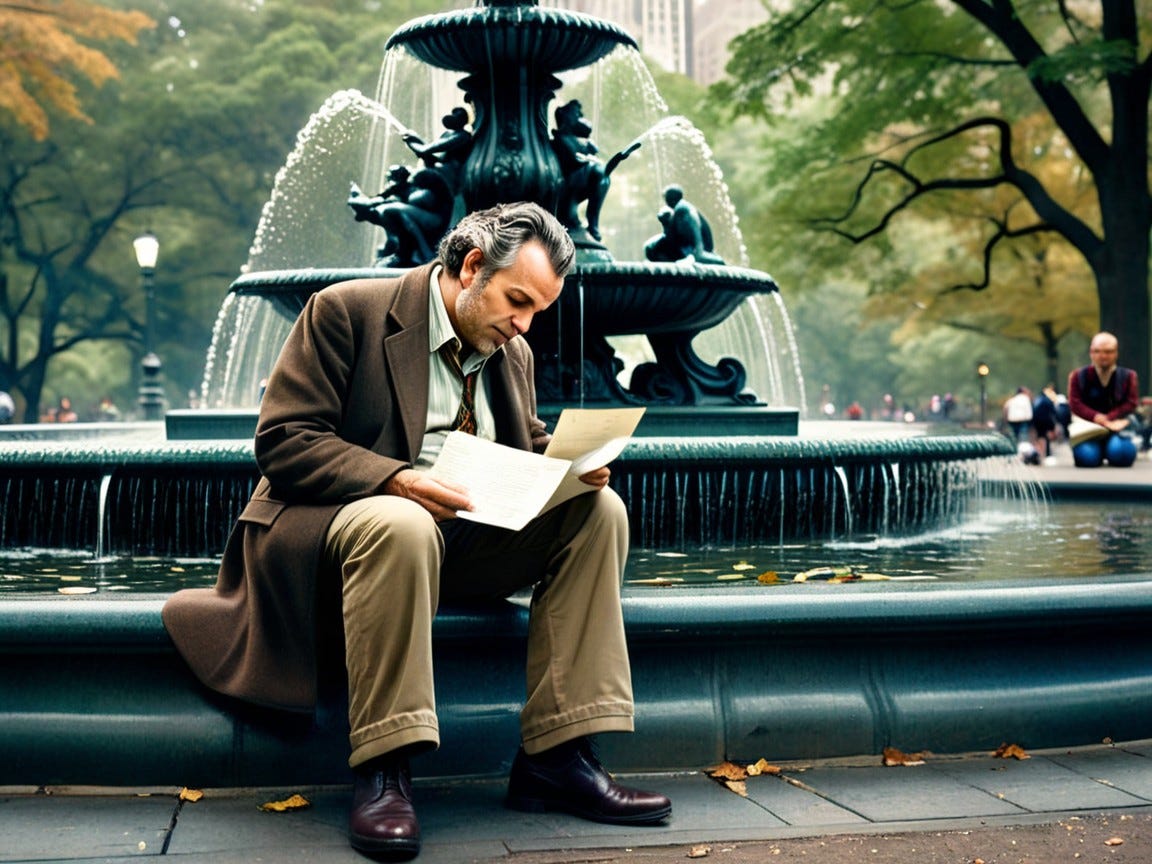In the days following the walk with Solomon, Elliot moved through his Park Avenue apartment like a man caught in a riptide—adrift yet restless, tugged by currents he couldn’t name. The walk had left a residue, a hum that wouldn’t quiet. He’d gone to bed that night with his notebook open on the dining table, pages scrawled with jagged lines and half-formed shapes. By morning, the euphoria had curdled into something heavier, a mood that flickered between exhilaration and unease.
Solomon’s words had planted a seed—creativity wasn’t about the sleek monuments Elliot Van Alen chased. It was about connection, about hearing the city’s pulse and letting it guide his hand. That realization thrilled Elliot, yes, but it also terrified him.
The tower he’d been designing, the one dismissed as “derivative,” had begun to morph in his sketches. Where it once stood rigid, a glassy spike meant to impress, it now softened—its base flared like roots sinking into the earth. Solomon had done that, with his talk of sound as structure, of buildings that didn’t just rise but lived.
Elliot saw it taking shape, a design that could redeem him, could silence the whispers of “has-been.” But with that vision came a challenge he hadn’t anticipated: to pull this off, he’d have to lean into something raw, something he’d buried beneath years of polished detachment.
This tower wasn’t his alone; it was theirs, a collaboration born from a blind man’s wisdom and a walk he hadn’t planned. That dependency gnawed at him.
What if Solomon’s insight faltered?
What if the design—their design—failed again?
Worse, what if it succeeded, and he had to admit he’d needed someone to pull him from the wreckage of his own stagnation?
The thought clawed at his pride, that old Van Alen entitlement he’d inherited like a birthright, the same pride that had once propelled him to the top and now threatened to drag him under.
Elliot’s instinct, honed by years of isolation, was to pull back. Distance was his refuge, a habit as familiar as the tailored overcoat he shrugged on each morning.
He’d distanced himself from Lena, his ex-wife when her quiet pleas for connection became too loud; from Claire, his sister, when her life’s milestones clashed with his deadlines; from the city itself, retreating to this high perch where the streets were just a pretty abstraction.
He sat at his drafting table, the apartment silent save for the faint hum of traffic far below, and tried to work. The lines wouldn’t come. His hand hovered over the paper, trembling slightly as if waiting for permission. He’d stare at the Chrysler Building through the window, its spire a silver rebuke, and feel the weight of William Van Alen’s legacy press down harder.
As a kid, he’d worshipped that tower, sketching it in crayon, dreaming of his own mark on the skyline. Now it mocked him, a benchmark he’d never touch—not because he couldn’t, but because he’d forgotten how to try.
Solomon had reminded him that his gift wasn’t in the name or the solitude; it was in the tether to others, to the city, to the stories humming beneath the steel. But accepting that meant dismantling the walls he’d built, and Elliot wasn’t sure he knew how.
By the third day, Elliot’s mood had darkened, a stew of frustration and longing. The pressure wasn’t just about the tower now—it was about who he’d become if he failed, or if he succeeded.
Irrelevance loomed, a specter he’d dodged for years.
By the fourth day, he stood at the window, forehead pressed to the glass, the cold seeping into his skin. The city glittered below, indifferent as ever, and he felt the pull of Solomon’s absence like a missing limb. He’d distanced himself, yes, but it hadn’t worked. The sketches stayed unfinished; the tower stalled in his mind.
The buzzer jolted him upright, a harsh buzz cutting through the apartment’s hush. Elliot hesitated, then crossed to the intercom. “Yeah?”
“It’s me,” came Solomon’s gravelly lilt, unmistakable even through the static. “Let me up, Van Alen. I’ve got something.”
Minutes later, Solomon swept through the door, cane tapping a staccato beat, his battered coat shedding the faint scent of asphalt and coffee. His cloudy eyes gleamed with fire, and before Elliot could speak, Solomon launched in, words tumbling like stones down a slope.
“You ever stand at the Flatiron, down where Fifth and Twenty-Third collide?” Solomon said, pacing the hardwood as if he could still feel the pavement underfoot.
“I was there today, just leaning into it, letting it talk. That old girl—she’s a wedge, you know, slicing the city like a blade, but she don’t fight it. The wind comes howling down Broadway, and she splits it clean, sends it swirling around her edges. You hear it—the gusts, the echoes off the limestone, like she’s breathing with the streets. I stood there an hour, maybe two, feeling how she moves with the chaos, not against it. That’s what your tower’s missing, man. It’s gotta breathe like that—channel the city’s howl, not just sit there pretty and deaf.”
Elliot blinked, caught off guard by the rush of it.
Solomon dropped into a chair, still buzzing, his hands gesturing as if molding the air. “I walked the whole damn triangle today, from the prow to the back, listening to how the sound bends. It’s not just a building—it’s a rhythm, a pulse caught in stone. You put that in your design, that give-and-take, and you’ve got something alive. Not another glass coffin like those new monstrosities—One Penn 1, all shine and no soul. I passed that too, felt its dead hum, and thought, ‘Elliot don’t need another mistake like that.’ No, this tower—it’s gotta sing, man. You hear me?”
Elliot nodded slowly, the image sinking in—the Flatiron’s wind-carved grace, its dialogue with the streets. He could see it: his tower’s flared base not just rooting it but funneling the city’s breath upward, a structure that danced with the noise rather than drowning it out.
Solomon’s enthusiasm was infectious, a jolt to his stalled mind, and for a fleeting moment, Elliot felt the thrill of possibility—a design that could rewrite his name in the skyline.
But as Solomon leaned back, grinning faintly—“Been working on it all day out there. Figured you’d want to know”—the spark dimmed under a creeping weight. That knot in Elliot’s chest tightened, not from the vision itself, but from what it meant. This wasn’t just inspiration—it was Solomon’s inspiration, another thread weaving him deeper into a tapestry Elliot had always stitched alone. The tower was theirs now, but the plaque would say Van Alen. The redemption would be his. And Solomon? He’d fade back into the city’s hum, a shadow with no credit, no claim.
Elliot’s fingers drummed against the armrest, his gaze drifting to the hardwood floor. He couldn’t shake it—the quiet gnaw of unease.
Finally, he spoke, voice low, halting. “I’ve been taking your ideas, Solomon. Your insight—it’s what’s driving this. And I keep wondering… what do you get out of it? My name goes on the drawings. My career gets pulled from the ditch. But you—”
Solomon’s grin faded, his head tilting slightly as if he’d caught the shift in the air. “You think that’s what this is about?”
Elliot hesitated, eyes flicking up to meet Solomon’s cloudy gaze. “I don’t know. I just—I don’t feel right about it. Like I’m leaning on you too much. Like I’m… using you.”
Solomon’s laugh was sharp, edged with something bitter. “Jesus, Van Alen. Every time I forget, you remind me.”
“Forget what?”
“That no matter how much I know, I still end up here. That some white man’s gonna feel guilty about taking what I give, because he’s afraid I’m his goddamn redemption story.”
Elliot flinched. “That’s not what I meant.”
“But it’s what you feel,” Solomon shot back. “You’re scared I’m the key to your comeback, and you can’t stand needing me. That’s your problem, man, not mine.”
The words hit like a slap—Elliot’s pride—Van Alen pride, sharp-edged and inherited—flared.
“If I was white, would you feel the same way? People gonna be talking about this—rich boy Van Alen found hisself a magic Negro.”
“That’s not fair.”
“That’s not fair is right! And that may not be your manner because of what I understand about you, it ain’t. But that’s coming, Elliot. That’s what they’re gonna be sayin’. And if you can’t handle your pride, you ain’t gonna be able to handle that.”
Elliot was silent.
“Fair.” Solomon snorted. “Nothing’s fair. You think it’s fair I lost my eyesight? You wanna talk about fair? This isn’t about you. It’s about that.” He jabbed a finger toward the window, toward the city beyond. “The place we both love. I’m not your motherfucking muse. I’m just another pair of hands.”
The silence between them thickened. “That night you stooped to an old black blind man seated on a subway grate and asked him if he needed help—what did I say to you?”
“Don’t we all?”
“Don’t we all. Don’t we all! I thank you for everything, Mr. Van Alen. And I bless you from the bottom of my heart.” Solomon exhaled. “But, I should go,” he muttered.
Elliot’s chest seized. He saw it then—the walls he’d built, not just around his apartment but around himself, a fortress of privilege and solitude that had kept him safe, kept him separate. Solomon’s words sliced through: needing me. He’d spent his life distancing—Lena, Claire, the city—because needing anyone felt like weakness, a crack in the Van Alen armor. But that night, something had shifted. He’d walked out into the cold, restless, not knowing why, and found Solomon—someone unlike him, someone who saw the world he’d stopped seeing. That moment had cracked him open, and Solomon had been pouring light through ever since.
“Wait,” Elliot said, voice rough, stepping forward. Solomon paused, half-turned, his silhouette framed by the doorway’s dim glow. “Don’t go. Please.”
Solomon’s brow lifted, but he didn’t move.
“You’re right,” Elliot said, the words spilling out. “I’ve been scared. Scared of needing you, scared of what it means that I can’t do this alone. I’ve got this name, this life, and I’ve used it to keep everyone out. But that night—I didn’t know it then, but I was looking for something. Someone. And you were there. You’ve been there, seeing what I couldn’t, and I’ve been too damn proud to say it: I need you. This tower—it’s not mine. It’s ours. And I’m grateful, Solomon. More than I know how to tell you.”
Solomon stood still, his cloudy eyes unreadable, then a faint smile tugged at his lips. “Gratitude’s a start,” he said, his voice softening. “Awareness is better. You’re waking up, Van Alen. That’s enough for tonight.” He tapped his cane once more, a deliberate beat, and stepped back into the room. “Now, let’s talk about that tower. It’s still gotta sing.”
The Van Alen Building rose over the next year, a structure unlike any Elliot had dreamed before—a sinuous tower of glass and steel, its base flared to embrace the street, its upper reaches rippling like a caught breath. The critics called it a revelation, a dance of form and function, but Elliot knew its heartbeat: Solomon’s rhythm, woven into every line. The Flatiron’s lesson lived there—the way it channeled the city’s howl through acoustic veins, letting the wind sing against its skin. It wasn’t timeless; it was alive, a testament to two men who’d found each other in the city’s churn.
Solomon stayed—nights at the diner turned to nights in Elliot’s apartment, sketching by sound while Elliot traced the lines. Their friendship grew, a quiet thing of coffee and arguments, laughter and silences that needed no filling. When the tower opened, they stood together on its top floor, the city sprawling below, and Solomon’s hand rested on Elliot’s shoulder, a steady weight. “We did this,” he said, and Elliot nodded, feeling the truth of it down to his bones. The Van Alen name glittered on the plaque, but Solomon’s echo rang louder, a pulse that would hum through the steel long after they were gone—a connection as enduring as the city itself.
The End
© 2025 Michael Arturo
If you appreciate the content
Buy Me A Coffee
Support by hitting the like button or leaving a comment.
Welcome to Michael’s Newsletter. Writer of contemporary political/social commentary, parodies, parables, satire. Michael was born and raised in New York City and has a background in theater and film. His plays have been staged in New York, London, Boston, and Los Angeles.
Michael also writes short literary fiction. Below is a link to his first collection.
FLATIRON and other tall tales
Other stories …


















Share this post